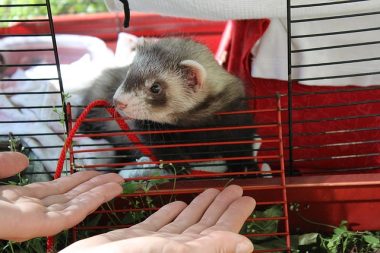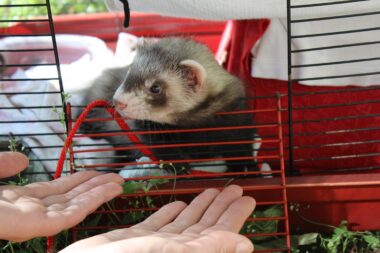The small and cute ferret is the only domesticated species of the Mustelidae family. Other relatives of the ferret are wild animals like otters, badgers and weasels. Due to their history of domestication, a ferret makes a good, low-maintenance and comforting pet. Most ferrets exhibit a lively and inquisitive nature which complements the curiosity of human beings.
They are famous for sleeping up to 18 hours each day. But when they are awake they are fun, joyful and active. Their sleep cycles are flexible and can change overtime according to your schedule. A lot of exercise and social interaction keeps their spirits and health up. But you should also watch out for certain diseases these little creatures are prone to.
Sometimes you need to rescue ferret which has escaped its cage. Owing to their curious nature, ferrets can move out to explore their surroundings. They can also leave the house and roam in the streets. But the chances of that happening are slim. Under such circumstances you should be prepared and prompt to rescue ferret.
Finding a Lost Ferret
Locating a lost ferret is the first step to rescue ferret. The problem with ferrets is not that they are hostile and difficult to capture. On the contrary, happy ferrets are social and friendly towards humans. Things get tricky when they decide to hide in an obscure and secretive place. If you are trying to rescue a ferret, pay attention to these steps –
- Begin your search from inside the house. It is likely that the ferret is hidden behind a drawer, inside a cupboard or under some furniture. This animal loves to hide in improbable places where it feels safe. Ask for help from friends and family so you can survey the house faster.
- If you cannot find the ferret anywhere at home, it is time to spread the news. Put out posts on social media regarding the lost ferret. You should also design simple posters with the ferret’s face and the owner’s contact details. Paste it in local public areas that allow you to do so.
- It is also a good idea to inform your local animal shelters and veterinarian. Get in touch with them for advice and hand out your posters, so they can paste them in their offices. Animal shelters could provide you with more experienced rescuers who will aid you.
- Some ferrets may have a microchip installed in them. If that is the case, contact the company which implanted the microchip so you can track it down.
- Carry a flashlight and a bag of treats. Visit the possible hiding locations of a ferret and leave some treats out. This will lure the ferret in.
- Be gentle when you pick up a ferret. Wear protective gloves to hold the ferret and place it safely inside a portable small cage.
Tips on How to Rescue Ferret
If you plan to rescue ferret, there are a couple of important things you should keep in mind.
- Get to know the rescuer person or organization. If getting a ferret as a pet is your purpose, look up various rescuers who put these animals up for adoption. Ensure that the ferrets were rescued and not captured in wild for the sole purpose of selling. Do some research on your own. Surf social media platforms like Facebook and find out animal shelter or homes that keep ferrets. You should pay a visit to these shelters and get in touch with the owners or the caretakers.
- As a rescuer, when you save a ferret, certain protocols must be followed. First, quarantine the animal for a week or two. During this period have a veterinarian run some medical checks on the ferret. Problems like fleas and worms should be treated as soon as possible. This makes the animal more comfortable and drastically increases its chances for adoption.
- The quarantine period is also a good time for you and the ferret to get to know each other. This is especially useful if the ferret is not accustomed to human contact. Spending time with the animal will make it more comfortable around other humans and promote a healthy relationship.
- Superficial check-ups are seldom enough. You need a thorough diagnosis of the ferret as you are unaware of its medical history. Some rescued ferrets may have underlying tumors, internal damage and blockages or handicaps like blindness and lack of hearing. This also means you might have to shell out some extra money for the treatments. You could approach animal welfare societies for free treatments or get in touch with other related NGOs (Non-governmental organizations).
- A good way to take care of the ferret’s medical expenses is by getting animal insurance. Doing this will take care of unsightly medical expenditure and take a lot of financial burden off your shoulders. You need to do some research and find out which select companies provide this facility.
- Once the quarantine period is over, do not immediately put the animal with the rest of the rescued ferrets. For at least a week, supervise the playtime and feeding time. You need to ease the ferret into its new environment. Otherwise, the animal can show signs of distress and even aggression. If the ferret seems happy and healthy, you can safely introduce it to the other ferrets.
Caring for a Ferret

After you have managed to rescue ferret, take proper care of it. Knowing about their diet and lifestyle can aid you in this process.
Diet and Exercise
As carnivores, ferrets need meat-based food for good health and sustenance. A proper diet for ferrets needs the right proportion of protein (about 34 per cent from animal sources) and fats (about 22 per cent from animal sources). Do not substitute their diet with dog or cat food. Instead, look for food specifically packaged for ferrets. Raw meat from turkey or chicken is a good option for meals and snacks. Keep vegetables and fruits away as ferrets are not omnivores. They will not be able to digest the fiber and end up with digestive complications. In extreme cases, plant-based meals can lead to gastrointestinal blockage or choking.
Ferrets sleep a lot. But they still need some movement and exercise. Ensure you remove your ferrets from the cage to an exercise area where the animals should spend at least two hours every day. Whether it is a single two hours exercise session or smaller periods divided into two to four playtime depends on you and your schedule. Remember, ferrets like to play and be active. To prevent them from escaping, block the exit points and escape routes. Ensure that the area is free from substances which could be toxic to the animal, like plants and pesticides.
Housing and Litter Box
As mentioned earlier, ferrets sleep for a long time, between 14 and 18 hours each day. So ensure that the sleeping area is clean and cozy. Pet stores these days offer a wide variety of beds for ferrets. Your choices range from tents and cloth tubes to hammocks. If you wish to save money, an old shirt, a soft towel or even a blouse sleeve should do the trick. Some ferrets tend to chew on fabrics and cloth. But this behavior is noticed in younger ferrets. As they mature, the ferrets will discontinue the habit.
The material of the ferret cage should be resistant to the digging habit of the animal. But do not go for an aquarium because it blocks air circulation. There should be sufficient space inside the cage for the ferrets to move around and relax comfortably. Although you can invest in a multi-level cage, make sure that it does not include steep ramps. Ferrets are not good climbers and can fall, injuring themselves.
You can train most ferrets to use the litter box. Remember to use pelleted litter than kitty or clay litter as the latter can create a lot of mess. Ferrets like to burrow in clean litter. The clay dust could damage their fur. Unlike cats, these animals do not cover their waste up. So you need to regularly replace the litter material a couple of times every week. Otherwise, their cage will begin to emit a bad odor.
Grooming and Handling
You do not really need to groom a ferret. In fact, over-grooming can damage their skin and coat. You may be prompted to wash your ferret due to their musky smell. But that odor comes naturally to the animal and does not imply a lack of hygiene. Similarly, the ears of a ferret produce wax which is reddish-brown. Control your urge to clear out this wax as it protects their ears. What you should do is trim their nails every 6 weeks. Ferret nails can become very sharp and could get entangled in cloth or carpets.
Keep children younger than 6 years of age away from a ferret. They are not naturally aggressive but can become defensive if treated improperly. If it feels threatened, a ferret will bite hard. Also, their eyesight is poor. So keep them away from elevated places where they could fall from and get injured.








